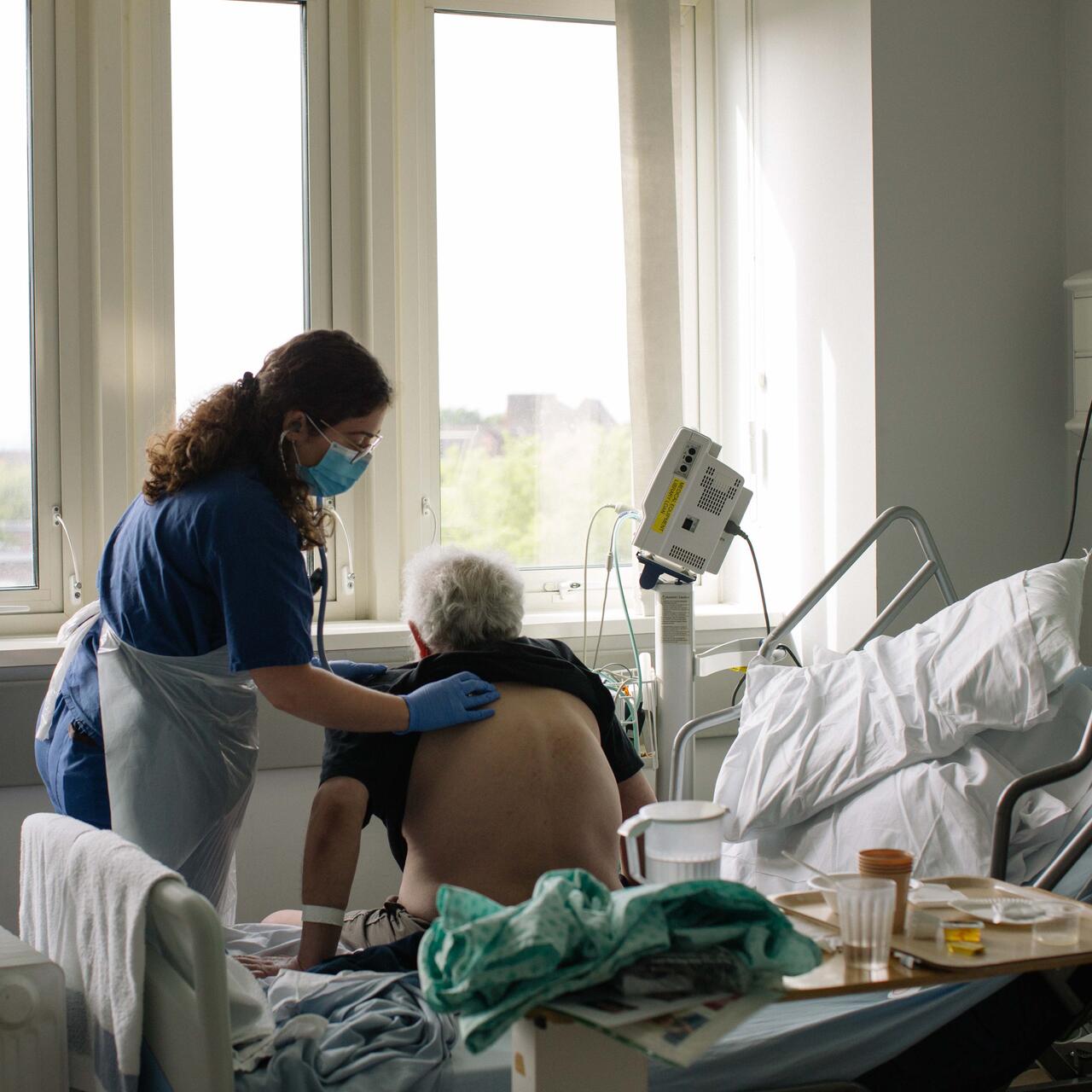
Every day, refugees who fled war and persecution are waking up and heading into battle against COVID-19. In hospitals, clinics and communities around the world, they are putting their own lives at risk to help the sick and vulnerable. Because when you have gone without care, you make it your mission to heal.
Meet the refugee doctors, nurses and healthcare providers battling the coronavirus.
Anxhela
Refugee. NHS Doctor. Essential Worker.
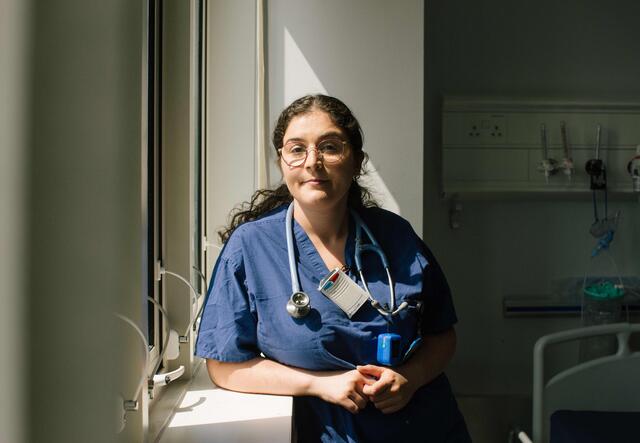
Anxhela is a 25-year-old junior doctor working in a North London hospital. She is also a refugee from Albania. Currently working on a respiratory ward treating patients with coronavirus, Anxhela never expected that her introduction to her profession would be a global pandemic.
Often, people are surprised when I tell them I’m a refugee. I say it proudly. I want them to question their stereotypes.
“At the beginning, it was exhausting physically, but also emotionally, because there were lots of people who were very sick and lots of people deteriorating. We wanted to do more for them. We wanted to be able to offer more medicine and other treatment, but there was nothing else we could do.
“The PPE makes it hard to connect with patients, as they can’t see our faces. I bring in a photo of myself so at least they know what I look like underneath it all.
“Today, I’m working on the respiratory ward, where the majority of my patients are recovering from COVID-19. having come off ventilators in intensive care. In a way, I’m lucky now because we often get to see patients go home.
“My experience of being a refugee impacts how I do my job as a doctor for the NHS. It helps me to see people beyond their medical conditions and think about their lives as a whole. I don’t think I would have as great an appreciation for all of that if it weren’t for my past.
"Often, people are surprised when I tell them I’m a refugee. I say it proudly. I want them to question their stereotypes. I want them to know how much refugees contribute toward society. ”
Go inside a shift with Anxhela: read the photo story and watch the film.
Doha
Refugee. Health Volunteer. Humanitarian.
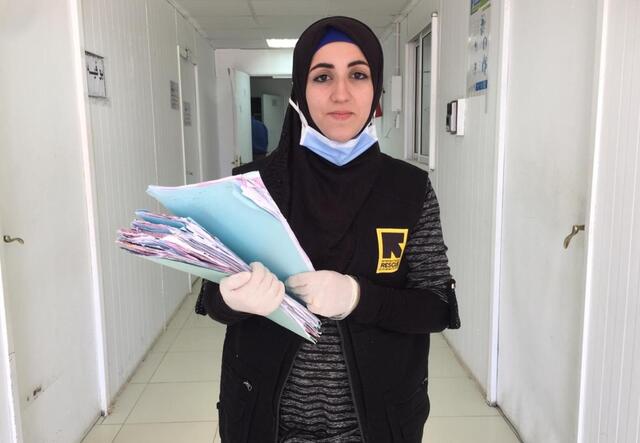
Twenty-four-year-old Doha Ibrahim Ammouri lives in Azraq refugee camp in Jordan with her husband and children. Originally from Syria, she had been looking forward to continuing her education in philosophy when the war forced her to leave everything behind.
Today, Doha volunteers as a receptionist in the IRC’s reproductive health clinic in Azraq camp. Despite a national lockdown in Jordan, Doha and her colleagues continue to provide essential medical care—safely.
What gives me strength is being able to provide services to people during this difficult time.
“Health care is the most urgent need in Azraq Camp because there is no alternative [to the IRC clinic]” she says. “I’m proud that we continue to provide services to the largest number of beneficiaries possible, despite the coronavirus pandemic or any other circumstances.”
Although she finds hope in humanitarian service, Doha dreams of a time when refugees can return home to rebuild their countries. “My wish is for the people in the camp to live in a better place and to stay safe,” she says.
“What gives me strength is being able to provide services to people during this difficult time.”
Dr. Edna
Refugee. Doctor. Humanitarian Hero.
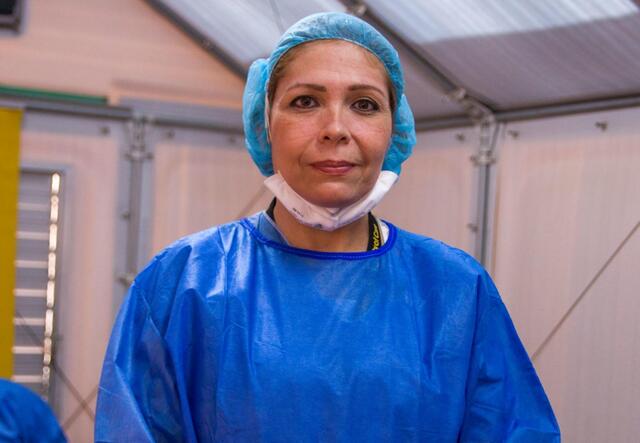
Dr. Edna Patricia Gomez is a gynecologist who works for the International Rescue Committee in Cúcuta, Colombia. She left Venezuela in 2018 with her family as the country spiralled into a profound socioeconomic crisis, and robbers and extortionists targeted her practice.
Today, Dr. Edna helps other Venezuelans in Colombia with screening and treatment for the coronavirus. She also continues to provide women's health services, including critical prenatal care for expectant mothers.
Refugees always have the capacity to contribute more than people admit.
"Medicine is the best," she says of her profession. "It’s hopeful. It’s positive. I don’t think there’s anything more perfect than the moment of creation of life, of birth. Of delivering a baby and seeing the look of satisfaction on its mother's face.”
Dr. Edna stresses that the world must come together if we are to beat the COVID-19 pandemic—and that refugees are a critical part of that response.
“It’s fundamental to understand that we, as human beings, need to unite and complement each other," she says. "Refugees always have the capacity to contribute more than people admit.
“I want all the refugees in the world to know that they’re not alone.”
Torbertha
Refugee. Nurse Practitioner. Essential Worker.
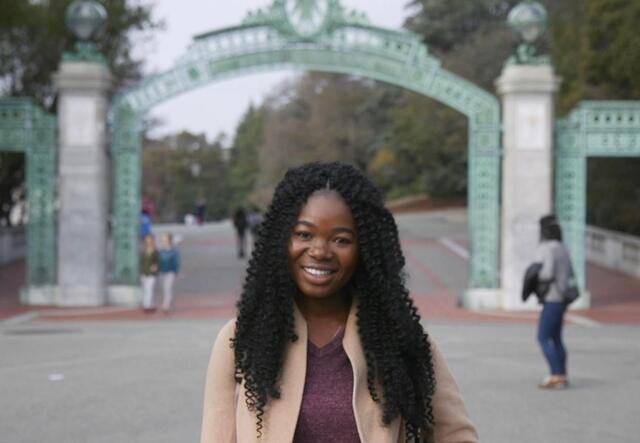
Torbertha is a nurse practitioner living in Oakland, California. A refugee from Liberia, she was inspired to pursue her career when she was a child in a refugee camp in Ivory Coast.
I've always wanted to work with people who are more vulnerable, people who need medical care but can't afford it.
After seeing many people in the camp die from easily preventable and treatable diseases, Torbertha’s older sister fell ill. Unlike so many others, her sister survived. She recovered because a nurse practitioner gave her the help she needed. Torbertha remembers thinking, “Wow, that is amazing. That’s what I want to do when I grow up.”
Today, Torbertha works in clinics in the Oakland area that serve mostly low-income and homeless patients. Though work during the coronavirus is challenging, she finds hope in the difference she is making in people’s lives.
“I've always wanted to work with people who are more vulnerable, people who need medical care but can't afford it. I am hopeful going to work every day because I'm giving back to my community and I'm doing something that will prevent the spread of the coronavirus. I am helping people that really need the help.”
Shadi
Refugee. IRC Staffer. Health Hero.
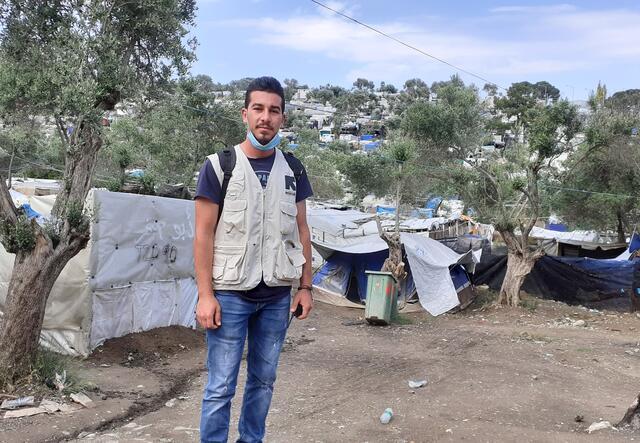
Shadi Mohammedali fled Gaza in 2018, he crossed the Mediterranean Sea in a dinghy and lived in a refugee camp in Greece for over a year. He used the time to teach himself English. In December 2019, he was granted asylum. Now, he's working for the IRC, raising awareness about how asylum seekers living in Moria camp can protect themselves from the coronavirus.
I used to live in a refugee camp … I made it out of the camp, so I think I can inspire others.
"I used to live in a refugee camp, sharing a small shelter with nine people, so I really know how refugees are feeling. I made it out of the camp, so I think I can show them inspiration, that there's hope. There's always hope.
"I wanted to work for the IRC because they help asylum seekers—I wanted to be a part of that. I saw how the humanitarian organisations help refugees when I was living in the camp. Now I'm proud that I can help others.
“I'm trying to educate refugees in Moria about how to protect themselves from the infection—about hand-washing etiquette, wearing face masks and social distancing. Due to their environment, it'll rapidly spread to others, because they're living so close together.
"You've got to understand: a refugee is a human, we are the same. Refugees have hopes, have dreams, they deserve to have a good life. It's hard to leave your family, to start from scratch alone. I had to leave. My life was in danger. I didn't have any other choice. Today, I draw strength from my colleagues, the IRC team have treated me like family."